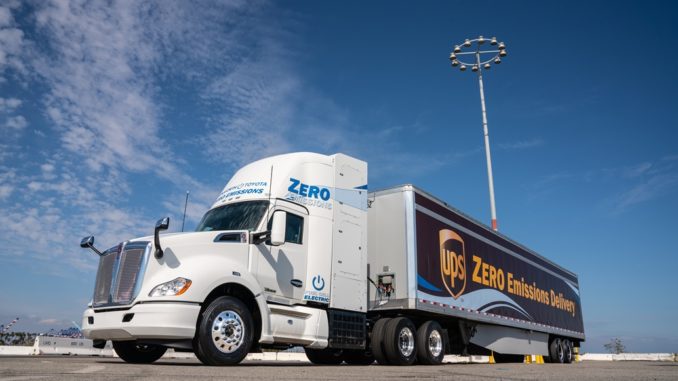
Toyota and Kenworth unveiled the first of jointly developed fuel cell electric heavy-duty trucks during a special event held at the Port of Los Angeles.
The new generation zero-emission truck expands on the capabilities of Toyota’s first two Project Portal Proof-of-Concept trucks through enhanced capability, packaging, and performance while offering an estimated range of more than 300 miles per fill, twice that of a typical drayage trucks average daily duty cycle.
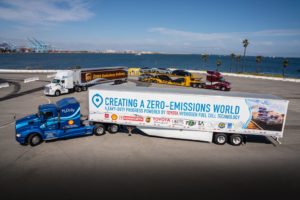 Toyota and Kenworth will deploy a total of 10 trucks as part of the Zero and Near-Zero Emissions Freight Facilities Project (ZANZEFF), hauling cargo received at the Ports of Los Angeles and Long Beach, throughout the LA Basin.
Toyota and Kenworth will deploy a total of 10 trucks as part of the Zero and Near-Zero Emissions Freight Facilities Project (ZANZEFF), hauling cargo received at the Ports of Los Angeles and Long Beach, throughout the LA Basin.
CARB has awarded $41 million dollars to the Port of Los Angeles for the ZANZEFF project as part of California Climate Investments, a California initiative that puts billions of Cap-and-Trade dollars to work reducing greenhouse gas emissions, strengthening the economy and improving public health and the environment―particularly in disadvantaged communities.
Since operations began in April 2017, the Project Portal “Alpha” and “Beta” Proof of Concept Class 8 trucks have logged more than 14,000 miles of testing and real-world drayage operations in and around the ports of Los Angeles and Long Beach while emitting nothing but water vapor. The first Kenworth/Toyota Fuel Cell Electric Truck (FCET) under the ZANZEFF project will begin drayage operations in the fourth quarter, increasing the ports’ zero emission trucking capacity and further reducing the environmental impact of drayage operations.
Expanding operations
The latest Fuel Cell Electric truck utilizes the Kenworth T680 Class 8 model combined with Toyota’s fuel cell electric technology and is part of -the ZANZEFF project. Pioneered by the Port of Los Angeles with leading support from Toyota, Kenworth, and Shell―the trailblazing endeavor provides a large-scale “Shore-to-Store” plan and a hydrogen fuel-cell-electric technology framework for freight facilities to structure operations for future goods movement. The initiative will help reduce emissions by over 500 tons of Greenhouse Gas and 0.72 weighted tons of NOx, ROG and PM10.
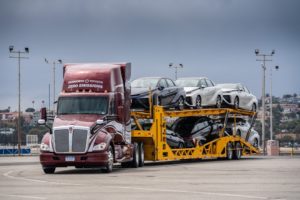 The Port of Los Angeles, a global maritime leader with respect to zero-emission and near-zero emission technology testing and adoption, will develop the project in several phases, ultimately encompassing initiatives in Southern California, the Central Coast Area, and Merced County. The initial phase is designed to kick-start the leap to a new class of goods movement vehicles, while reducing emissions in designated disadvantaged communities.
The Port of Los Angeles, a global maritime leader with respect to zero-emission and near-zero emission technology testing and adoption, will develop the project in several phases, ultimately encompassing initiatives in Southern California, the Central Coast Area, and Merced County. The initial phase is designed to kick-start the leap to a new class of goods movement vehicles, while reducing emissions in designated disadvantaged communities.
The project phases will include:
- Ten new zero-emissions fuel-cell-electric Kenworth/Toyota FCET developed through a collaboration between Kenworth and Toyota to move cargo from the Los Angeles and Long Beach ports throughout the Los Angeles area, the Inland Empire, the Port of Hueneme, and eventually to Merced. The trucks will be operated by Toyota Logistics Services (4), United Parcel Services (3), Total Transportation Services Inc. (2), and Southern Counties Express (1).
- Two new large capacity heavy-duty hydrogen fueling stations will be developed by Shell in Wilmington and Ontario, California. The two new stations will join three additional stations located at Toyota’s Long Beach Logistics Services and Gardena R&D facilities to form an integrated, five-station heavy-duty hydrogen fueling network for the Los Angeles basin. Together, these stations will provide multiple sources of hydrogen throughout the region, including over 1 ton of 100% renewable hydrogen per day at the Toyota Logistics Services station to be operated by Shell, and important research and development advances at a pair of stations operated by Air Liquide, all enabling zero-emissions freight transport.
- Expanded use of zero-emissions technology in cargo terminal and warehouse environments, including the first two zero-emissions yard tractors to be operated at the Port of Hueneme, as well as the expanded use of zero-emissions forklifts at Toyota’s port warehouse.
Source: Toyota Motor Corporation

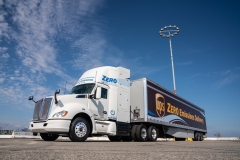
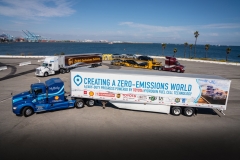
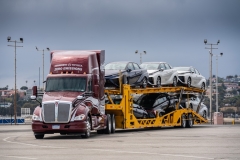

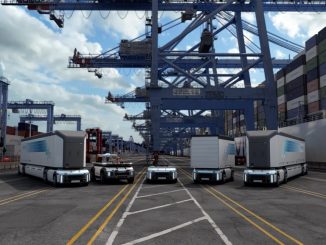

Be the first to comment